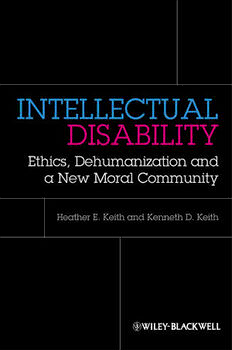Table Of ContentIntellectual Disability
ForJamie
Intellectual Disability
Ethics, Dehumanization, and
a New Moral Community
Heather E. Keith
GreenMountainCollege
and
Kenneth D. Keith
UniversityofSanDiego
A John Wiley & Sons, Inc., Publication
Thiseditionfirstpublished2013
(cid:2)C 2013JohnWiley&Sons,Inc.
Wiley-BlackwellisanimprintofJohnWiley&Sons,formedbythemergerofWiley’sglobal
Scientific,TechnicalandMedicalbusinesswithBlackwellPublishing.
RegisteredOffice
JohnWiley&SonsLtd,TheAtrium,SouthernGate,Chichester,WestSussex,PO198SQ,UK
EditorialOffices
350MainStreet,Malden,MA02148-5020,USA
9600GarsingtonRoad,Oxford,OX42DQ,UK
TheAtrium,SouthernGate,Chichester,WestSussex,PO198SQ,UK
Fordetailsofourglobaleditorialoffices,forcustomerservices,andforinformationabout
howtoapplyforpermissiontoreusethecopyrightmaterialinthisbookpleaseseeour
websiteatwww.wiley.com/wiley-blackwell.
TherightofHeatherKeithandKennethKeithtobeidentifiedastheauthor(s)ofthiswork
hasbeenassertedinaccordancewiththeUKCopyright,DesignsandPatentsAct1988.
Allrightsreserved.Nopartofthispublicationmaybereproduced,storedinaretrieval
system,ortransmitted,inanyformorbyanymeans,electronic,mechanical,photocopying,
recordingorotherwise,exceptaspermittedbytheUKCopyright,DesignsandPatentsAct
1988,withoutthepriorpermissionofthepublisher.
Wileyalsopublishesitsbooksinavarietyofelectronicformats.Somecontentthatappears
inprintmaynotbeavailableinelectronicbooks.
Designationsusedbycompaniestodistinguishtheirproductsareoftenclaimedas
trademarks.Allbrandnamesandproductnamesusedinthisbookaretradenames,service
marks,trademarksorregisteredtrademarksoftheirrespectiveowners.Thepublisherisnot
associatedwithanyproductorvendormentionedinthisbook.Thispublicationisdesigned
toprovideaccurateandauthoritativeinformationinregardtothesubjectmattercovered.It
issoldontheunderstandingthatthepublisherisnotengagedinrenderingprofessional
services.Ifprofessionaladviceorotherexpertassistanceisrequired,theservicesofa
competentprofessionalshouldbesought.
LibraryofCongressCataloging-in-PublicationDataappliedfor
HardbackISBN:978-0-470-67432-1
AcataloguerecordforthisbookisavailablefromtheBritishLibrary.
CoverdesignbySimonLevyAssociates.
Setin10.5/13ptMinionbyAptaraInc.,NewDelhi,India
1 2013
Contents
Acknowledgements vii
Prologue:WhyStudyDisability? ix
PartI TheRootsofDehumanization 1
1 IntellectualDisability:HistoryandEvolutionofDefinitions 3
2 TheSocialConstructionofPurgatory:IdeasandInstitutions 19
3 AFailureofIntelligence 37
4 TheConsequencesofReason:MoralPhilosophyand
Intelligence 53
PartII OutoftheDarkness 77
5 DefiningthePerson:TheMoralandSocialConsequencesof
PhilosophiesofSelfhood 79
6 AlternativeViewsofMoralEngagement:Relationalityand
Rationality 95
7 CultureandIntellectualDisability 116
PartIII DisabilityEthicsforaNewAge 131
8 QualityofLifeandPerceptionofSelf 133
9 ApplicationandBestPractices:Rights,Education,andEthics 151
10 Epilogue:VisionsoftheFuture 170
References 177
vi Contents
NameIndex 215
SubjectIndex 225
Acknowledgements
Forintroducingmetothehumanepossibilitiesofphilosophy,Iwouldlike
to thank Thomas Alexander, Larry Hickman, Eugenie Gatens-Robinson,
CharleneHaddockSeigfried,thelateMichaelEldridge,MarkJohnson,and
other membersof the Society for the AdvancementofAmericanPhiloso-
phy.ThankstoToddLekanandMicahHesterforconversations,responses,
andenlighteningworkaboutphilosophyanddisability,andtoMag.Cathrin
Dorner,oftheSchlossHartheimmemorialandeducationcenterinAlkoven,
Austria, for helping me to understand the complex roots of dehumaniza-
tion. The philosophy department at Dartmouth College was gracious in
hosting me as a visiting scholar during the early stages of this research. I
amabetterteacherandresearcherthankstomystudentsandcolleaguesat
GreenMountainCollege,andIespeciallyappreciatethehelpoflibrarystaff
members and my enthusiastic undergraduate research assistant, Pragatee
Dhakal.
IalsothankKenKeithforintroducingme,insideandoutsideofaclass-
room, to the diverse nature of humanity and the importance of respect
and care for all people, and for continuing to be an important influence
on my professional life. And I thank Connie Keith for instilling a desire
to be my best self. Steven Fesmire will always have my gratitude for his
seeminglyundyinginterestinmyintellectuallife(aswellasourfamilylife),
hisimaginativeworkinphilosophy,andhispatience.
H.E.K.
Poultney,VT
Firstandforemost,mylifehasbeenenriched,sincethetimeIwasachild,
bythefriendshipandgoodcompanyofcongenialpeople,toonumerousto
name, with intellectual disability. I will, however, single out Nancy Ward,
viii Acknowledgements
whose unabashed honesty deserves unabashed admiration. I will never
forgetthecourageandintegrityofthelateShirleyDean,SaraKramer,and
MarkRapley,whogavetheirlivestothewelfareofpeoplewithintellectual
disability.BobSchalockhasbeenavaluedfriend,collaborator,andsounding
boardformorethanfourdecades,andforthatIwillalwaysbegrateful.Larry
Hinmanprovidedencouragement,goodideas,andcongenialconversation,
allhelpingtoshapeourperspective.IalsoowethankstoDavidBraddock
and the Coleman Institute for Cognitive Disabilities at the University of
Coloradoforaccesstoawealthofarchivalmaterial,andtotheUniversity
of San Diego for support of research leading to this project. Our editor,
MattBennett,encouragedthisproject,andwethankhimforthat.And,as
always,ConnieKeithcontinuestomakemyworkandmylifebetterinways
shewillneverknow.
K.D.K.
Omaha,NE
Prologue
Why Study Disability?
Any student of history, culture, or science might wonder whether it is
anachronistictostudysomethingthatmayseemtobeashrinkingconcern.
Withmedicaltechnology,industrialization,stateofthearttoolsforgenetic
testing,andwideravailabilityofeducation,wemightforecastthatdisability
is,orsoonwillbe,athingofthepast.However,itistheseverysocialgoods
that require us to continue to investigate what it means to be disabled in
ourtime.Forexample,onebenefitofmodernmedicineisalongerlifespan,
butwithanincreasinglyelderlypopulationcomephysicalandintellectual
impairmentssuchasdementia(Halpern,2008).SusanWendell(2008)noted
that“unlesswedieyoung,wearealldisabledeventually”(p.828).
Someeducationaltools,suchasliteracyandtechnology,areincreasinglya
causeoflowersocialfunctioningforindividualswhocannotreadormanage
complicatedtasks.Inmedievaltimes,aninabilitytoreadwasnotdisabling,
nor was surfing the Web an essential skill 50 years ago. Today, however,
readingandtechnologyuseareessentialtomostkindsofemploymentand
manyfacetsofcitizenship,creatingdisabilitieswherenonemayhaveexisted
before.Newmethodsofgenetictestingduringpregnancybegmanyethical
questionsaboutwhatchoicesparentshaveregardingthepotentialforrais-
ing childrenwith intellectual challenges.And physicalimpairment due to
wars,suchasthoseinAfghanistanandIraq,alsoheightenstheimportance
ofstudyingtheeffectsofdisabilityonqualityoflifeandfunctioninginsoci-
ety.Thoughwewillprimarilydiscussintellectualdisabilityinthisbook,our
theoretical frameworks will be interdisciplinary and will also incorporate
someworkfromthebroaderandappropriatelygrowingfieldofdisability
studies.Ouraimwillbetwofold:topresentapluralist,socialconstructivist
view of intellectual disability and its history; and to develop a contextual,
pragmatistmoral responseto complex ethical questions surroundingdis-
abilitythatareincreasinglyrelevanttousall.
x Prologue
WhyanInterdisciplinaryApproach?
Many authors have written books on intellectual disability. From clinical
textbookstoeducationmanualstohistoricalanalyses,thereisawiderange
ofresearchondisabilityfrombothindividualandsocialperspectives.How-
ever,mostofthisworkrepresentsfairlyspecializedapproacheswithinthe
disciplinesofpsychology,psychiatry,sociology,oreducation.Philosophers
(appropriately)haveveryrecentlybeguntoconsiderintellectualdisability
withinfieldssuchasappliedethicsandpoliticaltheory.
Previousworkhasprovidedvaluableempiricaldataandtheoreticaland
philosophical perspectives that have illuminated many of the important
issuesaffectingthelivesofpeoplewithintellectualdisability.Aninterdisci-
plinaryapproach,webelieve,canextendourunderstandingandcontribute
inimportantwaystoscientificandphilosophicstudyandtothedevelop-
mentofhumanepracticeandpolicy.Workingtogetherandusingresearch
fromavarietyofdisciplines,wesuggestthatthepartnershipofpsychology
and philosophy (which are, of course, only recently distinct fields) pro-
vides an interesting and useful approach that values both scientific and
ethicalanalysis.Thoughweappreciatethatspecializationisessentialtothe
deep study of any field, issue, or practice, we also believe that bringing
specialized work back to a more human level is needed to create positive
change in the world. In the introduction to his final work, The Conquest
of Mental Retardation, the late social theorist Burton Blatt (1987) argued
that specialization without a wider context causes isolation, allowing the
public,aswellasspecialists,tobelievethat“onlyaspecialistcanunderstand
anythingaboutamentallyretardedperson”(p.8),whichmayleadothers
insocietytoassumetheyhavenothingtodowithdisability.Specialization,
then,“causesfargreaterandmorewidespreadproblemsthanthevery‘dif-
ference’thatsetstheisolationmechanismsinmotion”(p.8).Blattbelieved
that making the study of intellectual disability a more natural part of the
continuumofhumanrelationshipswasneeded,inadditiontomoreskilled
clinicalservices,inordertoimprovequalityoflife.Wehopethatthisvol-
umecontributestoasocialconsciousnessandtheoreticalfoundationthat
integratesratherthanisolates.
Three concepts in particular impel us toward an interdisciplinary
approach with foundations in psychology and philosophy (both of which
are integrally tied to education). First, an approach from multiple disci-
plinespreventsreductionism.Reductionisticapproachesarecharacterized
by relying on only one perspective to explain the vast diversity of human

